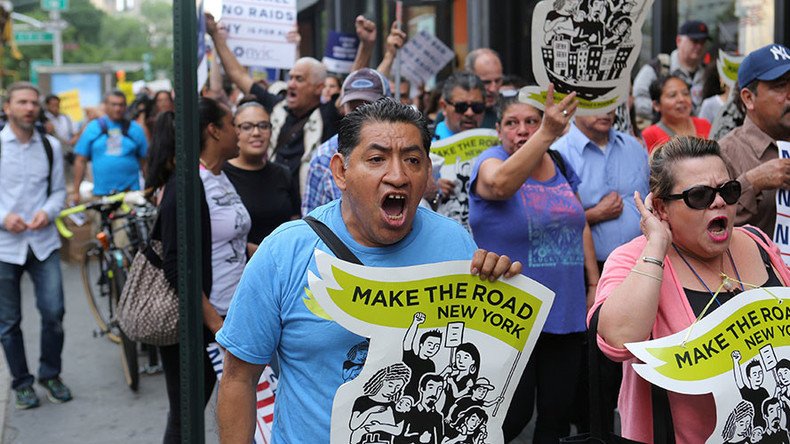Getting political: Nearly half of Americans have taken part in First Amendment activities in 2017

A survey of Americans’ attitude about their First Amendment rights found nearly half participated in at least one political action already in 2017. The most common action was signing petitions, followed by protesting.
The survey found more than a third (35 percent) of Americans have signed petitions so far this year, while more than 16 percent took part in political demonstrations, and nearly 12 percent participated in boycotts.
Strikes were the least common form of protest, with only 3.8 percent of respondents saying they participated this year.
74% of Americans do not think that fake news reports should be protected by First Amendment. Read more from #SOFA17. https://t.co/3bJscEsPQ1
— Newseum (@Newseum) July 10, 2017
Along with their political activities, respondents were asked about the state of the First Amendment, which protects the right to exercise religion, freedom of speech and the press, the right of peaceful assembly and the right to petition government over grievances. Survey respondents were asked if the First Amendment went too far in the rights it guarantees.
More than two-thirds (68.6 percent) disagreed with that statement, while 22.5 percent thought it did go too far.
Those ratios have remained fairly consistent over the 20 years of the survey, except in 2002 in the lead-up to the Iraq War, when 49 percent thought the Bill of Rights’ speech protections went too far, and again in 2014 when 38 percent thought so.
A troubling finding from our #SOFA17 survey: half of Americans support banning controversial speakers from colleges https://t.co/6eDxxXLAcN
— Newseum Institute (@NewseumInst) July 10, 2017
When asked about the free press, 67 percent thought the media should act as a watchdog of the government, with over 43 percent saying the media should try to report the news without bias.
The majority of respondents (71.5 percent) did not agree that “elected officials should be able to determine which media outlets are able to attend public briefings.”
JUST IN: First Amendment group sues Trump for blocking dissenting Twitter users https://t.co/CEQS7C47PSpic.twitter.com/K6oWpiDdDJ
— The Hill (@thehill) July 11, 2017
More than half of participants (53.2 percent) said they preferred news from outlets that were aligned with their own views, while 34 percent said their trust in news coming from social media had decreased in the past year.
Conservatives said leakers should be prosecuted at higher rates than liberals did, 64 percent versus 42.4 percent, and as well as that journalists should not publish information obtained illegally, 76.3 percent versus 55.9 percent.
On questions about freedom of religion, 62.1 percent of respondents said the government should not be able to hold Muslims to higher levels of scrutiny.
On questions of freedom of speech, when asked about the expression of racist views on social media, 54.9 percent said that such comments should not be allowed. There was a 10-point differential when it was broken down to participants from the Northeast versus the South and West regions, 62.2 percent to 52.5 percent.
When asked if colleges should be able to ban speakers on campus when those speakers had a history of racist views, the majority didn’t agree to a ban at 52.2 percent with 43.3 percent agreeing to a ban, and there were no regional variations.
The survey results come from telephone interviews conducted with 1,009 adult Americans and published in The State of the First Amendment on Tuesday. The annual survey is organized by the Newseum Institute and is now marking its 20th year.
“We were glad to find that most Americans still support the First Amendment, although it’s troubling that almost one in four think that we have too much freedom,” said Lata Nott, executive director of the First Amendment Center in a statement. “It’s also troubling that even people who support the First Amendment in the abstract often dislike it when it’s applied in real life.”
The age of participants ranged from 18 to 93 years, the majority were males at 50.8 percent and females at 49.2 percent. Most respondents were Whites at 66 percent, followed by Blacks at 14 percent and Latinos at 11.2 percent.














